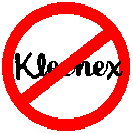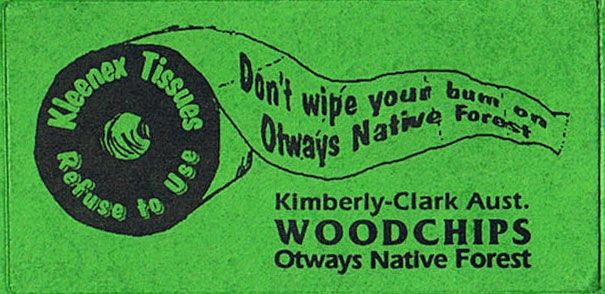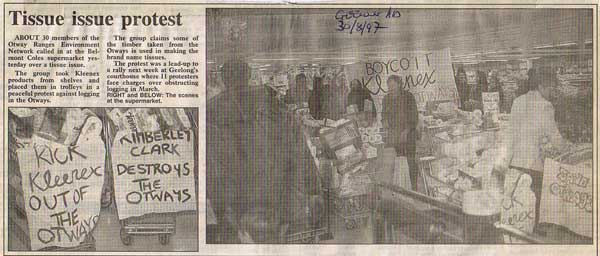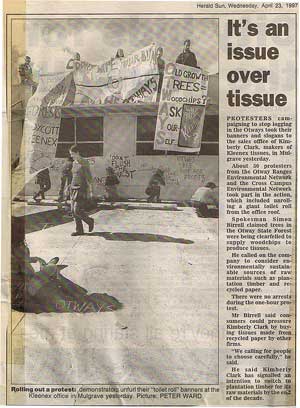
2. The Kleenex “consumer awareness campaign”
The first protest against the Kleenex brand name occurred at the Calco Log dump on the 3rd of November 1996. About two years later on the 10 December 1998, Kimberley Clark announced the company would stop sourcing woodchips from the Otways, three years before the Kimberly Clark Otways woodchip licence was due to expire. How was this done?
From the beginning it was OREN’s strategy to promote a positive "open disclosure" campaign based on solutions. Hence OREN never ever called for a boycott of Kleenex; instead OREN was involved in a consumer awareness campaign. (Note: that media and other conservation groups did still use the word boycott in describing the OREN camapign).
The consumer awareness campaign had two components,
|
 |
Fire was fought with fire. Kimberley Clark uses simple images of sweet little ducks and cute puppy dogs to promote Kleenex. OREN also kept the message simple.
Hence the slogan:
” Refuse to use Kleenex issues. Don’t wipe your bum on Otways native forest ”.
This marketing tool was effective because people though it was funny, remembered it and passed it on to others.
 |
This small sticker was made to be placed on or near toilets. The idea was to remined people (while they were using the toliet) to not to use Kleenex. |
The issue of an alternative product that was environmentally acceptable, competitively priced (often cheaper) was critical to the success of this campaign.
At the time, there were several small independent Australian tissue manufacturers whose products were 100% post consumer waste paper and avaliable in almost every supermarket. Alternative products at the time included "SAFE" by the Paper Converting Company and "Softex" by Cosco both manufactured in Brisbane inteh State of Queensland.
OREN contacted these manufactures and toured the Cosco Brisbane plant in 1997. The aim of the tour was to ensure the tissue products were in fact made from 100% post consumer waste paper.
The key of the consumer awareness campaign was to promote alternative products to Kleenex so that consumers could help save Otway native forest by simply changing brands. |
To promote the message, a diverse public communication strategy was set up to target both the retail and industrial sales of Kleenex tissues with the realistic aim of getting one in ten customers ‘nationally’ who would normally buy Kleenex, to stop buying the product. OREN calculated it would cost Kimberly Clark in Australia $20 million a year in lost sales, something they would not scoff at. |
OREN was doing nothing more than what any other companies do when the compete with one another to promote one product over another. Iin OREN’s case the motivation was not money but saving forests from clearfell logging.
| The following ethical buying guide was put together by Otway residents and University students. Click to download full pdf version. |  |
The target was both Kimberly Clark’s retail and industrial customer base which played out as follows.
2.1 Focus on retail market
Stickers
| A effective strategy was to make small stickers that were specifically designed to be put onto or near toilets everywhere. After all, in a toilet you have a small captive audience. It soon became hip(cool) to have a sticker on your toilet to act as a constant reminder for friends and family not to buy Kleenex. |  |
Note that OREN was not responsible for putting up stickers but did get a complaint from the Morland City Council officer who was sick and tired of removing “don’t wipe your bum on the Otways" stickers from public toilets.
These stickers went from one end of Australia to the other, even today faded stickers can still be seen in some places. These stickers impacted on KC’s retail market.
Protests in the Otway Forests, Cities and supermarkets.
Given the retail market is the biggest seller of Kleenex products, OREN took every opportunity to use the media to inform the community about the fact Kleenex was being made from clearfell logged Otway native forest. This included using regional and city based media to drive the Kleenex “consumer awareness campaign”. Protests occured involving local Otways residents in the Otway Forests and university students at the offices of KC and at supermarkets. The message about Kleenex was repeated again and again. As the campaign progressed, the way in which Kimberly Clark and the supermarkets reacted to the publicity continually changed. Hence the goal posts were moving all the time in relation to what worked to get media attention. |
|

Protest at a supermarket was reported in the Geelong Advertiser, 30 August 1997. Click to enlarge.
Choice Magazine
The Australian Consumers Association, (ACA, but now called Choice) is an independent consumer group which publishes a consumer advice magazine called Choice. The ACA became aware of the Kleenex issue once the OREN campaign began to develop a profile in the community.
Choice magazine ran a story (May 1998 edition) about the environmental issues regarding the tissue paper industry generally. The article had a focus on native forest logging and helped the broad community to become aware of the fact that Kleenex was made from native forest.
2.2 Focus on industrial market
University Campuses
The University Campuses with their many thousands of students and staff would purchase about $100,000 worth of tissues paper products every year to keep everyone’s bums clean while they are at the campus. So rather than run down to the supermarket everyday to buy hundreds of trolley-loads of toilet paper and tissues, the campuses have contracts with suppliers of tissue products.
Back in 1997, many of the campuses purchased their tissue needs directly from Kimberly Clark. With a combined lobbying effort by very enthusiastic students and conservationists, the universities purchasing policies could be changed to buy 100% post consumer waste paper products. Every time a campus turned away from Kimberly Clark the company lost a significant client. Many campuses made the switch and the economic consequences to Kimberly Clark quickly magnified.
Local Government
Similar to the Univerity campus situation, local government also buys large amount of tissue paper products and can be lobbied to change suppliers. In this regard, the Victorian Local Governance Association (VLGA) which is an independent advocacy group with many Victorian councils as members took up the issue. Initially the VLGA supported the campaign to promote 100% recycled paper products and avoided Kleenex as a way of promoting the use of curb-side wastepaper collection. This ‘concept’ was published in the VLGA magazine which was sent out to member councils.
This created instantaneous outrage by the native forest logging industry which sent in a group called Timber Towns Victoria (TTV) to lobby the VLGA. The arguments from TTV were presented to the VLGA at an open meeting. The VLGA then adopted the official position of facilitating a debate about the tissue paper issue without taking sides. Then various councils started to stop using Kimberly Clark products.
The great advatenge of having various local councils on side was to create a high level of legitimacy and credibility to the consumer awareness campaign in the eye of the general public. This then further fed back onto the Kleenex retail campaign.
Some positive media examples are below.
This is it, the bottom line TOILET tissue giant Kimberly-Clark wants to get to the bottom of why the Moreland Council is no longer buying it's products. |
Tissue ban nothing to be sneezed at TO 20 councils may join Moreland and refuse to use Kimberly Clark products. |
Corporations
OREN recieved confidential feedback. Many privately run businesses and some very large corporations who wanted to remain anonymous, made a decision to no longer buy Kimberley Clark products in sympathy of the Otway forests.

Don't know the meaning of a word? Check the glossary.
